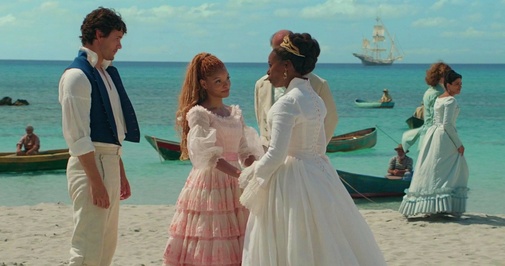Team Experience is discussing each Oscar category as we head into the precursors. Here's Elisa and Cláudio to talk Costume Design...
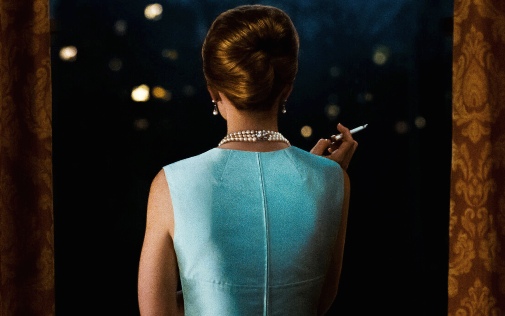 Will MAESTRO bring Mark Bridges back into the Oscar fold?
Will MAESTRO bring Mark Bridges back into the Oscar fold?
CLÁUDIO: To borrow an idea from Nathaniel, let me introduce the conversation with an imaginary outfit. Please think of me in a Priscilla powder blue suit tailored to Ferrari Italian perfection. There's a Wonka scarf in there, too, and Tomas' bearish coat from Passages on top. On my wrist, Felicia's pearls from Maestro, on my feet pink rollerblades from Barbie. For other accessories, I shall pick a revolutionary rosette from Napoleon to pin to my lapel and a pair of Victorian sunglasses from Poor Things. To complete the ensemble, Oppenheimer's hat with a Killers of the Flower Moon beaded band, everything topped by some showgirl-ready plumes straight out of Shug Avery's wardrobe. Do I look even more clownish than Melissa McCarthy and Brian Tyree Henry at the 91st Academy Awards? But I also look fabulous...maybe…
Pardon the silliness, dear Elisa. Will you indulge in the fantasy?
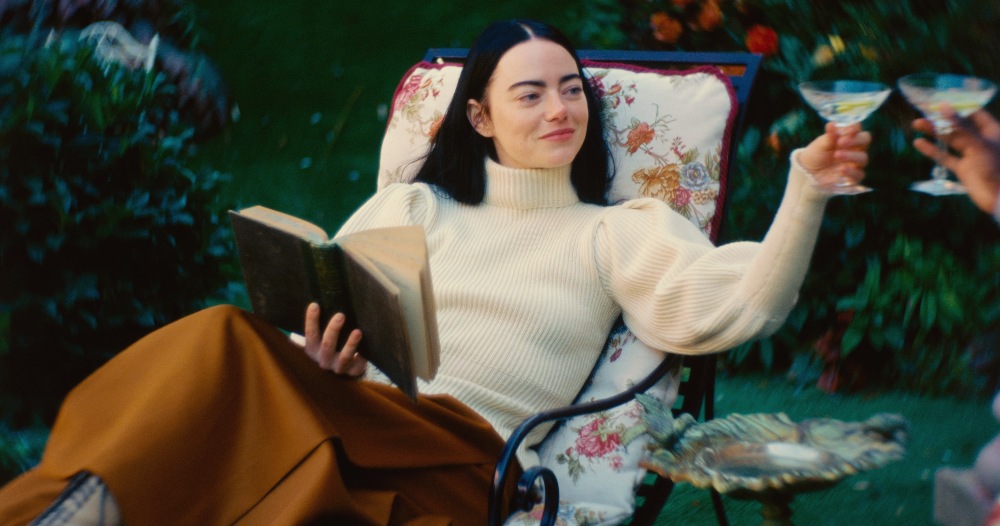 In POOR THINGS; Bella Baxter is fashion goals.
In POOR THINGS; Bella Baxter is fashion goals.
ELISA: Given my penchant for laziness and the bone-chilling weather here, I'm contemplating snatching Agathe's cozy purple sweater from Passages, pairing it with some jeans, and sliding into those trendy white furry boots from Barbie's reality excursion. Toss in a warm blanket from Scorsese’s collection, just for good measure. Alternatively, I might pilfer one of Emma Stone's stunning, wildly colorful outfits from Poor Things. Honestly, I'd happily rock any of them daily, even the more outdated ones.
Your outfit sounds absolutely fabulous – a visual Frankenstein of various periods and styles that could potentially snag a nomination in this Oscar round. But here's the real question: will the Academy take a leap towards something more contemporary? Am I just wishfully thinking, or could we witness a shift from the usual Gothic/Austen-like period dramas to more modern, or even contemporary, nominations? What's your take on it?
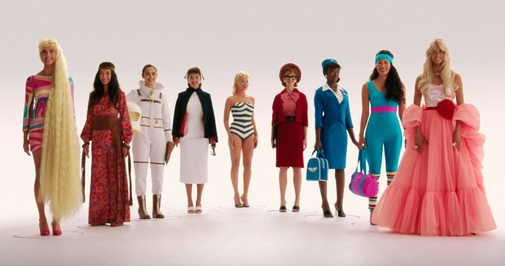 BARBIE is a treasure trove of vintage styles.
BARBIE is a treasure trove of vintage styles.
CLÁUDIO: Though I'd categorize it as fantasy and its aesthetic pulls strongly from the 80s/90s, Barbie feels like this year's touch of contemporary fashion. That it's one of the frontrunners for the win makes it even more special.
It's curious that, beyond Poor Things’ wacky twists on the 1890s, almost all of these year's costume contenders are set in the 20th century. I hadn't thought about it until you mentioned the modernity of the race, but you're on the money.
ELISA: Now, onto two more pressing matters: which movies truly deserve the spotlight in this category for the impact the costumes have on the overall result, and which wardrobe steals your heart? My votes go to Passages and Poor Things.
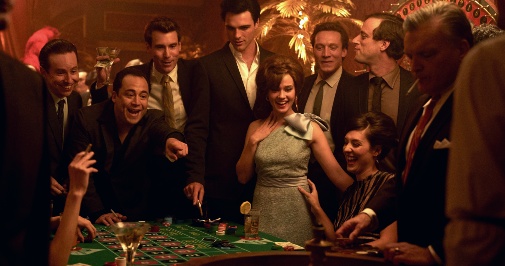 PRISCILLA's Stacey Battat should already be an Oscar nominee.
PRISCILLA's Stacey Battat should already be an Oscar nominee.
CLÁUDIO: If we're talking about the impact of costumes in a movie, then Priscilla should be a lock for the nomination. So much of Coppola's latest is about characterization through evasion, studying the emptiness left in the wake of a toxic union and the curated style covering it all up. You could remove every line of dialogue and music cue from the exercise, and the costumes would still tell you all you need to know about the dynamics at play. Honestly, it's been a while since I've seen a film where costume design is so strongly tied to the dramaturgy.
ELISA: I agree that Priscilla's costumes effectively depict the power dynamics between her and Elvis, showcasing her evolving wardrobe and the choices imposed on her. Coppola adeptly uses outfits to convey the vulnerability of a young girl navigating a world where she lacks power. It becomes her unique strength, subtly showing how she embraces the style chosen by her husband as her own armor.
This subtlety is even more pronounced in Poor Things. Lanthimos carefully designs Bella's wardrobe to visually represent her youthful mind and the influence of significant male figures in her life—the creator/father and the journey companion/lover. As the movie progresses, colors fade, and extravagant cuts diminish, symbolizing Bella's transition into a resilient young adult who has overcome suffering without being defined by it.
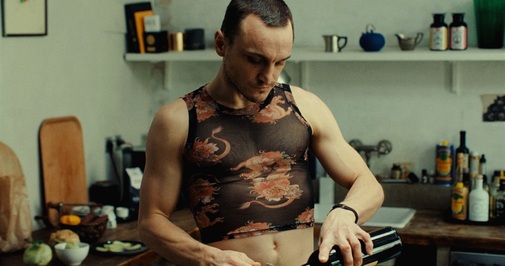 Franz Rogowski rocks the "after sex" crop top in PASSAGES.
Franz Rogowski rocks the "after sex" crop top in PASSAGES.
CLÁUDIO: As for favorites, I must agree with one of your choices. It's Passages all the way! I want everything Ben Whishaw wears in my size, thank you.
ELISA: I truly hope the Academy embraces a more contemporary approach. Watching Passages and witnessing the bold statement made by the protagonist with the iconic "after-sex top" when meeting her girlfriend's parents, I couldn't help but think, "These costumes deserve a nomination, especially that top—it's a standout statement!”
CLÁUDIO: I felt similarly about many movie wardrobes this season - Polite Society, A Thousand and One, etc. - and most have zero chances of nabbing a nomination.
Then again, I shouldn't proclaim any title as an impossible nominee. This category often loves lone nominees, so anything's possible. I wouldn't be surprised if the likes of Napoleon or Chevalier leaped over Best Picture favorites. Ever since watching Are You There God, It's Me Margaret?, I've been thinking about Ann Roth's chances this season. She did have that Barbie boosting her profile.
Going back to Waddington, her trajectory contrasts with Jacqueline West, whose Killers of the Flower Moon designs have brought her to the race again and will potentially make her the most nominated costumer without an Oscar in Academy history.
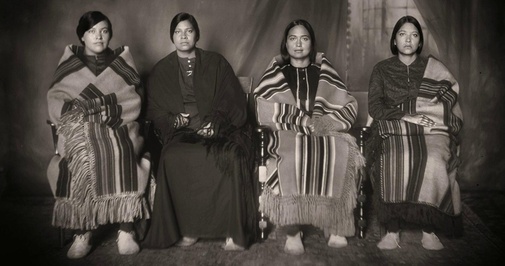 Elisa covets an Osage blanket from KILLERS OF THE FLOWER MOON. Do you?
Elisa covets an Osage blanket from KILLERS OF THE FLOWER MOON. Do you?
It's incredible work, historically precise and culturally astute, articulating the social structures of the Osage people and their white neighbors during the 1920s. There's the way West complicates our reading of Ernest by having him constantly tied to Mollie and her people through his clothing. There's the hat she gifts him, of course, but also the beaded band he starts wearing, Osage blankets refashioned into a cowboy jacket, little things here and there. And then you have Hale and his driving gear, owl-like goggles making him appear like the omen of death from Native religion. As a fashion history nerd, I was especially dazzled by the style extrapolations from extant photographs, creating a look that combines tradition and modernity, European fashions mixed with Osage heritage. It's so unique and could only come from a close collaboration with the Nation's artisans.
Will overdue narratives go around within the branch, and will they influence the results? Durran from Barbie already has two Oscars, while someone like West is always the bridesmaid, never the bride. And Ellen Mirojnick from Oppenheimer is a legend who's never been nominated!
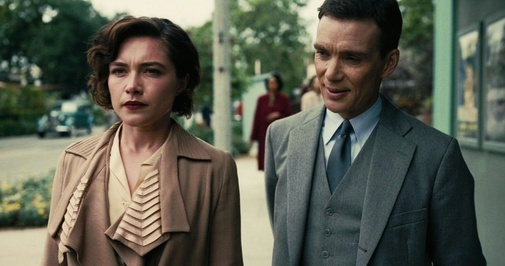 OPPENHEIMER may not be flashy enough for this branch.
OPPENHEIMER may not be flashy enough for this branch.
ELISA: We're no strangers to this category, Cláudio, and we've speculated before about how the number of wins and nominations influences the final ballot. I'm starting to feel that this evaluation might not hold as much sway here compared to other categories. While we often overestimate its impact until it reaches legendary status (cue Roger Deakins, Diane Warren, and the usual suspects), I've noticed it might not be as decisive.
Our experience tells us this category has a distinct "taste" and is resistant to evolving beyond its comfort zone. This year, the relative scarcity of titles conforming to their usual costume preferences might open the door to more movies with "contemporary" or "modern" costumes in the final ballot.
Let's also consider the latecomer: what are your thoughts on Wonka? It seems to possess the kind of wardrobe narrative that could secure it a nomination. Upon viewing it, I was struck by how well it captures the concept of "poor people wearing worn-out clothes, but with taste." It effectively communicates the dire conditions the characters face daily, with outfits that signal their challenging circumstances, unlike the Hunger Games prequel, where the gorgeous costumes don't quite align with the protagonists' struggles. Despite their difficult lives, everyone is adorned in beautifully designed and seemingly well-crafted clothes, only occasionally showing signs of wear with a touch of dust. I appreciate the appeal of the costumes in the Hunger Games, but personally, I found them somewhat counterintuitive in terms of visual storytelling.
CLÁUDIO: As both audience and designer, I sometimes get frustrated with filmmakers who over-emphasize poverty through sartorial misery. No color, no detail, no nothing! Sure, it works as a visual shortcut, but it also flattens experiences, insinuating that a taste for beauty is something only the elites possess. That's why I appreciate the curatorial fanciness of the District Twelve people in The Ballad of Songbirds and Snakes. However, I get your point and found myself wishing for more delineated differences between the broke Snow family and their wealthy Capitol neighbors.
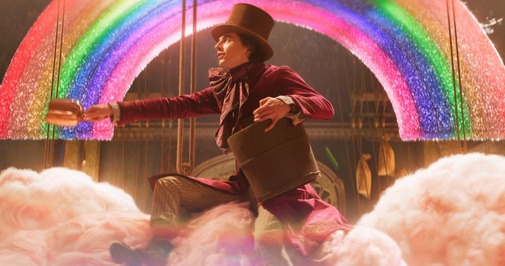 Lindy Hemming negotiates Dahlian magic and Dickensian misery in WONKA.
Lindy Hemming negotiates Dahlian magic and Dickensian misery in WONKA.
Wonka is better at this, with Lindy Hemming allowing every character to have a palpable affection for pretty things. Even if the garments sometimes look old or ragged, they're assembled with purpose and a personal touch. I especially appreciated how Willy's collection of scarves gets deployed in various configurations. Moreover, as the film constantly negotiates vague plausibility and pure fantasy, the costumes' internal logic is flexible. It must be, or it'll collapse under all that whimsy.
Another film most folks will only get to watch this month is Maestro, where Mark Bridges is up to his usual excellence. Part of me wants to say he's got this, but I also sense his work may be too low-key. Last season, he faced a similar problem with The Fabelmans, though, at the time, we predicted him for the nomination.
Finally, The Color Purple is our second December musical and, like Wonka, seems to live in between worlds of realistic dispossession and fantastical glitz. Will these late-comers shake the race?
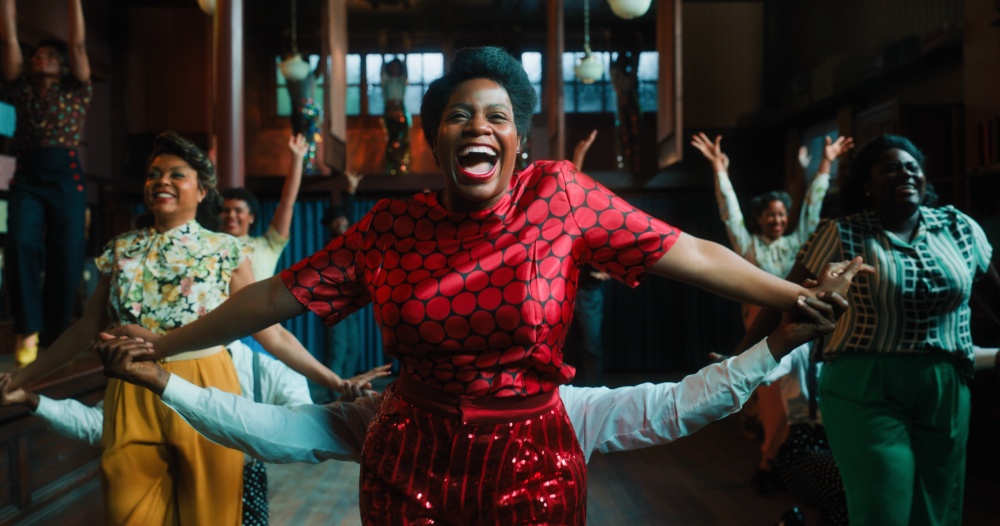 Will THE COLOR PURPLE be this year's musical nominee?
Will THE COLOR PURPLE be this year's musical nominee?
ELISA: There are insiders predicting that at least one of The Color Purple and Maestro will secure a nomination in this category. Having only seen the latter, I agree with you. However, my impression is that both movies aren't gaining the expected momentum, at least not in time to strengthen their claim in this category. You know, the technical nominations a movie gets not only for its quality but also because it's considered one of the most important of the year. I believe Oppenheimer can gain that kind of advantage here. I'm curious to see if a movie populated almost entirely by suits can land a nomination, marking another departure from traditional choices in this category.
Now, for my final predictions…
BARBIE, Jacqueline Durran
POOR THINGS, Holly Waddington
KILLERS OF THE FLOWER MOON, Jacqueline West
MAESTRO, Mark Bridges
OPPENHEIMER, Ellen Mirojnick
CLÁUDIO: As much as it pains me to predict her snub, I fear Mirojnick will be left out of the ballot again. Even if The Irishman is a good precedent for suit-heavy wardrobes getting nominated, Oppenheimer has to miss somewhere. Of course, it'll miss Best Visual Effects, but predicting it in all other eligible categories still seems too much. My predictions are…
BARBIE, Jacqueline Durran
POOR THINGS, Holly Waddington
KILLERS OF THE FLOWER MOON, Jacqueline West
WONKA, Lindy Hemmings
THE COLOR PURPLE, Francine Jamison-Tanchuck
Barbie and Poor Things are locks in my book, and I think Killers of the Flower Moon will do well, too. Wonka feels right up this branch's alley, as does The Color Purple, so I'm going with those two for the final slots. Still, it wouldn't surprise me if Maestro got in instead, or even something like The Little Mermaid. After all, they sure love Disney, and Colleen Atwood is one of the category's reigning queens.
Oh well, we never know anything for sure, and that's where all the fun is. For the contenders, there's just one thing to say: Start your engines, and may the best designer win!
RELATED READING:
- Other Oscar Volleys – Makeup, Editing & Production Design
- Nathaniel’s Oscar Charts
- Team Experience Predictions – From Picture to Screenplay
- Career Overviews – Ellen Mirojnick & Jacqueline Durran
- The Academy’s Favorite Fashion Eras
